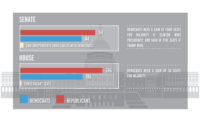Debate over the use of E-Verify—a federal database used for confirming employment eligibility in the United States—turned confrontational at a jobsite in Tullytown, Pa., on Oct. 13. State Rep. John Galloway (D-Bucks County) walked onto a site at the Levittown Town Center and began shooting video while asking the project superintendent about the employment status of bricklayers working that day.
“Are there illegals working on this site?” Galloways asks on the video, which was posted by the Bucks County Courier Times. “Do they have papers?”
The superintendent, who works for the project’s construction manager, ECS Construction Management, Bethlehem, Pa., told Rep. Galloway he was trespassing and had to leave the site. The superintendent, whose name was not released, called Tullytown police and began cursing at the representative when he refused to leave. Police arrived, but no charges were filed.
The incident occurred the same day that E-Verify legislation sponsored by Galloway died in the state Senate. The bill, which passed the Pennsylvania House in July, would have required all construction contractors to verify employment eligibility using E-Verify. Under the proposed bill, contractors who violate these rules could be barred from state projects or, in the case of private construction work, could face forfeiture of state licenses or certifications.
Galloway did not return calls for comment about the incident.
Jeffory Beckers, chief operations officer at ECS Construction Management, says his company requires its subcontractors to follow all employment eligibility requirements. Following the incident, ECS required its subcontractors on the project to sign affidavits stating they understand the terms of their contracts, he said.
The masonry subcontractor, New Britain, Conn.-based Renzella Masonry, does not use E-Verify voluntarily but asks all employees to show Social Security cards, says the owner, Rick Renzella.
“They showed me their cards, and I trust them,” says Renzella. “They are legal.”
Beckers says the superintendent did not address Galloway’s questions about the employees’ statuses, but followed proper procedures. He says Galloway ignored “no trespassing” signs, walked onto the site without permission and acted beyond his legal authority.
“He has a right to know if the laws of the land are being respected in his jurisdiction, but I took issue with the fact that he acted like a federal agent and walked onto an active construction site without a hardhat,” he says. “I didn’t appreciate his Charles Bronson approach.”
Galloway’s campaign to require E-Verify in Pennsylvania is the latest in a piecemeal approach to implementing the system around the country.
Since Sept. 2009, federal contractors have been required to use E-Verify to confirm employment of both new hires and existing staff. Since 2008, a wide range of laws and regulations at the state and local levels has taken effect in 14 states. For example, Georgia and South Carolina require companies contracted by the state to use the system, while Arizona and Mississippi require both public and private contractors to use the system.
But some existing laws have met significant opposition. On Dec. 8, the U.S. Supreme Court will take up a legal case against Arizona’s law, which was upheld by the 9th U.S. Circuit Court of Appeals in 2008.
In September, the Mississippi Senate Judiciary A Committee held hearings about the state law that requires use of E-Verify, which has been in place since 2008. Among the issues are concerns over possible errors in the system regarding an employee’s status.
The accuracy of the system and the piecemeal approach to employment verification across the country has caused some consternation among contractor groups. Kelly Knott, who handles human resources and labor congressional relations for the Associated General Contractors of America, says contractors are concerned about liability issues with E-Verify.
“Is the system easy to use? Yes. Is the database that it works off necessarily the best? No,” she says.
Medium to large contractors that operate in multiple geographic markets also are concerned about having to follow a mix of regulations regarding verification.
“In some cases, a city may have a law that differs from a state law,” she says. “That’s the argument for comprehensive immigration reform. This is a federal issue that needs to be addressed at the federal level, not with different states doing different things.”
In the run-up to the November elections, E-Verify has gained limited traction as a campaign issue. In the Colorado governor’s race, third-party candidate Tom Tancredo vowed to push for an E-Verify mandate, if elected.
Although many candidates are quiet now, Knott says that, after the November elections, she expects the E-Verify issue will receive more debate when discussions about immigration reform return to Capitol Hill.
“Immigration is always a tough issue during an election year,” she says. “This year, it hasn’t been much of an issue at all.”



Post a comment to this article
Report Abusive Comment